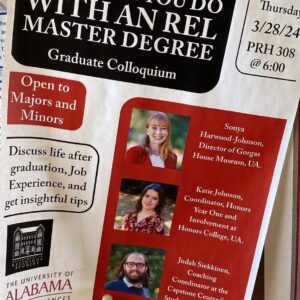
Studying about the practices, narratives, and ideas that people commonly identify as religious is fascinating. What students do not often realize (at least at first) is how much the skills that they develop in Religious Studies classes benefit them not only in other classes but also after graduation. Three alums of our MA Religion in Culture program returned to the department last month to talk about their experiences working at UA. One of those MA alums did their BA at Alabama, while the others were REL majors elsewhere before coming here.
Sonya Harwood-Johnson, originally from Grimes, Iowa, earned her BA in Anthropology and Religious Studies from Iowa State University. She came to Alabama for her MA, focusing on American Paganism and WitchTok—but gradually began to pursue another passion: international education. While within our department, Sonya had an internship with the Office of International Student and Scholar Services, where she then started working in her final semester before graduating in 2022. In March of 2024, she was appointed as Director of the Gorgas House—a museum on the University of Alabama’s campus. Such a significant move illustrates the value of the Religious Studies training for her. While an engineer or accountant may be trained to do one particular job, the skills developed in Religious Studies (social analysis, critical thinking, research, communication, project management, etc.) apply to a wide range of jobs, enabling her to shift positions and advance.
Katie Johnson completed her BA at the University of Alabama and finished her MA here in 2023. Her research interests combine history, archaeology, religion, myth, and culture. Katie received her MA in Religious Studies, with a certificate in both Digital Humanities and Museum Studies. Her job search after graduation took several months, but Katie now works full-time with the University of Alabama’s Honors College as the Honors Year One Coordinator. Her experiences in the job market highlighted the need for persistence and the effort to refine her presentation in interviews, including articulating how Religious Studies strengthens her ability to work with a range of students.
Judah Siekkinen came to UA after earning his BA in Religious Studies and Geography from Youngstown State University. In our department, Judah was able to connect his interests in pop culture, politics, and religious studies with our MA’s emphasis on social theory. Judah became particularly interested in helping students who face challenges while pursuing an education. Thus, he pursued internships in Accessibility and Disability Services. After graduating in 2022, Judah found a position at the Capstone Center for Student Success, where he now works as a Coaching Coordinator, utilizing the range of skills he developed in the study of religion to help a wide range of students succeed.
During the colloquium, our 3 alumni-turned-guests began providing advice for students and graduates looking for jobs, whether at UA or elsewhere.
Advice:
- Find what you are passionate about and then be pragmatic. Figure out how to make a career that builds on those passions. For example, all three have found opportunities to help students learn in staff positions on campus.
- Network constantly. Chatting with people from other parts of the university and expressing interest in their program helps.
- Hone those soft skills. Anyone can learn how to code, but it takes significantly more to learn how to talk to people
- Research the job before you apply. Learning more about the position, the office, and the emphases in that office can help you prepare a stronger application and interview.
- Reflect upon your interviews. Immediately afterwards, think about your answers in the interview. If a question in the interview caused you to stumble, practice developing a better answer that demonstrates your skills.
- Make yourself stand out. Continually update your resume and CV to fit the job you are applying for, but keep a full resume detailing everything so that it is easy to adapt for the next opportunity.